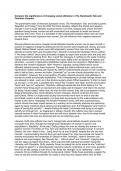Compare the significance of changing social attitudes in The Handmaids Tale and
Feminine Gospels
The postmodern texts of Atwood's dystopian novel, The Handmaid's Tale, and Duffy's poems
'Beautiful' and 'History' from the 2002 Feminine Gospels, reflects the limited and negative
change in men's social attitudes towards women over time. Despite both writers and their
speakers being female, women are still overlooked and subjected to sexist and sexual
behaviour from men. Thus, it is inevitable in their patriarchal societies where men are seen
as more powerful and important than women, this will influence their negative behaviour
towards them.
Atwood reflects how men's changed social attitudes towards women can be seen as both a
positive or negative change by looking at how the women were treated pre, during, and post
Gilead. Before Gilead, women were still subjected to sexism from men who were freely
allowed to harass them and sexualise them. Atwood's Commander illustrates this by calling
it "the meat market" which uses animalistic imagery to depict how women were the prey and
men the predators desiring them. But, overall this misogyny is nothing on the scale of during
Gilead where women are even prevented from basic rights such as freedom of speech and
education - as seen in oppressive totalitarian regimes such as currently in Afghanistan or in
literature like Orwell's dystopian 1984. However, arguably, during Gilead men's social
attitudes towards women have improved. Through the state's enforced rules, such as the
handmaid's modest clothing (as inspired by Islamic fundamentalist groups) or men not being
able to talk to them, women are better "protected" as "no man shouts obscenities at us. No
one whistles". However, this is just publicly. Privately, Atwood presents male attitudes to
women as sexist and sexually exploitative. This is emphasised in private settings where men
are allowed to rebel - such as in the doctors surgery where Offred questions "is that his hand
up my leg?", or the men in jezebels who look at her "breasts" and "legs" and the provocative
"bare" and "low cut" costumes. Therefore, although people like the Aunts believe it is "no
wonder these things [such as harassment and rape] used to happen" and blame the woman
for being "nearly naked" rather than the man for their crimes, they still occur despite it being
illegal emphasising how social attitudes haven't changed. Atwood continues this even
post-Gilead. While it is implied that society has reverted more back to what it was like
pre-Gilead, sexism is still prevalent. It is done both consciously by the male professor who
makes a joke about "enjoy[ing]" the female Professor's looks, and also subconsciously
(which shows how deep rooted sexism is in society) as he indirectly enforces the patriarchy
again by being "cautious about passing moral judgement upon the Gileadeans" and "held no
hope of tracing the narrator" - despite finding the male Commander and trying to yet again
identify her through him - as happened in Gilead. Overall, this reflects how men's sexism
towards women is clear throughout time and will occur despite rules, due to the deep rooted
societal notion that men are dominant and can do what they want.
Likewise, Duffy also reflects how men's misogynistic social attitude towards women has
increased over time, through the change from idealisation of women to sexism and
exploitation in 'Beautiful'. At the start, Duffy portrays the men as viewing the women in a
positive manner. For Helen of Troy, who was deemed the most beautiful woman in Ancient
Greece, the men "stood in line... [and] swore to be true till death" despite the fact she was
married - communicating how far they love and respect her. Like how people are meant to
worship and protect the handmaids in Gilead for their "womb[s]", Helen's admirers use
religious and royal imagery like "divinely fair.... child of grace" and "princess", implying they
see her status as higher than theirs, which subverts their patriarchal society's hierarchy.
Likewise, with Cleopatra, Duffy presents Cesar as seeing her as his equal as she "matched
him glass for glass" in a stereotypically masculine activity of drinking, or even more powerful
than him as she causes a man who is "ten times her strength" to be "gibbering" - which
presents him as childlike through his nonsensical chatter. While these examples suggest the
men do see the women positively, the reality is that they only respect them here for their




